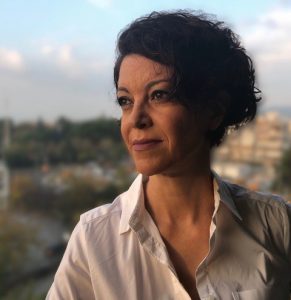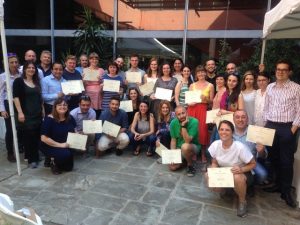For over a decade, Iphigenia Taxopoulou (Arts Criticism/Arts Policy and Management, 1991) has championed environmental sustainability in the performing arts. With Climate Change now an urgent topic, Iphigenia calls for relevant education in all sectors so improved practices can be implemented. She hopes the book she’s been commissioned to write, out next year, will contribute to the pool of practical knowledge.
 “To embed sustainability, you really need to begin by provide people with information and carbon literacy skills. Not only do you need to get people engaged, but somehow empower them to be able to affect change in their daily tasks and operations.”
“To embed sustainability, you really need to begin by provide people with information and carbon literacy skills. Not only do you need to get people engaged, but somehow empower them to be able to affect change in their daily tasks and operations.”
Iphigenia Taxopoulou, who studied Arts Criticism and Arts Policy and Management at City began looking for information about sustainable practices in the performing arts in the early 2000s. Working with large cultural institutions in an international context she could see how certain changes would not only provide financial benefits but environmental ones too.
“It struck me that there was always the problem of shortage of money, but at the same, time there was a kind of recklessness in relation to resources. For instance, I became mindful of the fact that once a production was over, the set would be thrown away, and in addition to wasted supplies and materials, there was also a huge amount of energy waste in theatre buildings and office spaces.”
As Iphigenia began to look at this as a case of “bad management”, her interest in environmental sustainability also grew, and she looked for those who had already done something in the area.
“I started researching and the first publication I came across was the very, very freshly published [scheme] Green Theatre by the Mayor of London. That was quite a revelation because I discovered that not only was there something out there, but a community of colleagues in London was already doing quite a lot in this area and had some kind of policy framework that was enveloped in this.”
Iphigenia, who is based in Greece, is a Founding Member and General Secretary of mitos21, a network of national theatres and public theatre institutions in Europe, including the National Theatre in London, UK. Through mitos21 she was able to learn from those theatres that were already doing good work, and also begin to help those institutions who hadn’t yet looked at their practices through an environmental lens.
“In 2013, I organised an international conference on sustainability and culture on behalf of mitos21, which was actually an opportunity to meet yet another community of practitioners who were involved in theatre and sustainability, including Alison Tickell from Julie’s Bicycle,” Iphigenia explains. “Following that, we set up a Green Managers Group inside our network. We began to try and incorporate concerns about environmental management inside the organisations by asking each member theatre to nominate one person that would be in charge.”
Through increased conversations about environmental sustainability, Iphigenia realised there was a lack of knowledge and sense of urgency at the time, which made theatre practitioners hesitant to consider change.
“I found that one of the main barriers for practitioners and institutions was the lack of knowledge and expertise, they just didn’t know what they had to do. So, I had the idea of setting up a capacity-building course for implementing environmental sustainability in cultural institutions with a focus on performing arts.”
The course (SCM Course – Sustainable Cultural Management) was co-designed by UK-based organisation Julie’s Bicycle, and Iphigenia is now an Associate member.
 Recognised as an authority on environmental sustainability in the performing arts sector, Iphigenia was recently approached by publishing company Methuen Drama (Bloomsbury Publishing) to write a book on the subject. Sustainable Theatre: Theory, Context, Practice will be available next year, and Iphigenia hopes it will serve as a practical guide to those who want to produce performing art in a modern, environmentally conscious way.
Recognised as an authority on environmental sustainability in the performing arts sector, Iphigenia was recently approached by publishing company Methuen Drama (Bloomsbury Publishing) to write a book on the subject. Sustainable Theatre: Theory, Context, Practice will be available next year, and Iphigenia hopes it will serve as a practical guide to those who want to produce performing art in a modern, environmentally conscious way.
“What I want to offer is a kind of shortcut to people who want to understand why it is important to embed sustainability in our field, which might look like a niche field in terms of the rest of the world, but every one of us need to do their bit,” Iphigenia says.
“Above all, what is useful in this book, are the international case studies. There are really wonderful examples. There aren’t many (so far!), but those that are out there are outstanding examples of pioneering organisations that can be such a motivation for people and organisations to follow suit.”
In Iphigenia’s opinion, however, the arts shouldn’t just operate sustainably when it comes to its buildings, catering, transportation, and so forth, it also needs to join the conversation.
“Theatres are basically organisations that can act like bridges between policy and society, in that they develop narratives and share messages. We need to know how to speak about this. One way is by sharing the environmental project, the other way is by creating work, so there’s also the artistic side of it. More and more artists are engaged with environmental issues.”
Iphigenia’s studies at City didn’t indicate a future commitment to environmental sustainability, yet as it turned out, in times of climate emergency, sustainable arts management is good cultural management. When asked what advice she would give those who also want to incorporate the welfare of the environment into their role, whatever their current studies may be, she says:
“Look for the pioneers. I think that’s how I started off and if I hadn’t found the sources of knowledge and expertise that existed at that time, I would basically be walking in darkness. There are pioneers in every field, a lot of innovation, dedicated people, you just need to look and find them. And when you find them, study what they’ve done, speak to them, get in touch, get inspired. It saves time because you know, you don’t have to reinvent the wheel all the time, you just learn from the best and then you take it further.”
What is Iphigenia’s prediction for the future?
“The pessimist in me fears that we’re running very late. And I don’t know if we can reverse the situation. But the optimist in me believes in the survival instinct of humankind. I think there is much more happening in the world than what we see. So, if you try to have another view, then you see that there are many people, scientists, many businesses, even big corporations, and a huge wave of individuals and communities working to avert the climate catastrophe. But I think that we need a bolder and more decisive, political model to push things forward,” she says.
Looking at her own future, Iphigenia hopes to continue her focus on education.
“What we’re doing now in this transition, as we call it the sustainable transition, is that we need to unlearn most of what we have learned and re-learn different skills that are appropriate for the climate challenge,” Iphigenia says.
“We should really invest in education, in all strands of education and more specifically, higher education, including the culture sector, so that the younger generations are equipped for the world we are (regrettably…) giving them. The current educational system is very much based on the past and the present, whereas the future and the challenges it will bring will have to be addressed through the lens of sustainability. The young people will need to be equipped with knowledge that will not be obsolete at graduation.”
Having said that, she still praises her studies at City for, in some ways, setting her on the path she is now.
“I’d like to say that I look back with nostalgia and gratitude to my studies at City University. To us on the theatre criticism course, it just really opened doors and windows to the world.”
A big thank you to Iphigenia Taxopoulou, General Secretary of the European theatre network mitos21 and Associate at Julie’s Bicycle, for talking to us about her work.
Edit: The title of Iphigenia Taxopoulou’s book was updated 09/05/2023
